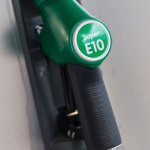The reason E10 fuel has been introduced as the standard grade fuel at forecourts across the country is to try and reduce carbon dioxide emissions. This fuel is made up on 90% regular unleaded petrol and 10% ethanol. Current petrol grades in the UK (E5) contain up to 5% ethanol, with the rest being regular unleaded petrol.
The Government claims that the introduction of E10 petrol at UK forecourts could cut transport CO2 emissions by 750,000 tonnes a year – the equivalent of taking 350,000 cars off the road.

Can E10 Petrol be used in my car?
All cars registered since 2011 are required to be E10 compatible and for any that are older than this, the Government have produced a simple online checkerhttps://www.gov.uk/check-vehicle-e10-petrol
What is E10 Petrol?
Since September 2021, forecourts have been replacing the current ‘E5’ petrol with ‘E10’ fuel, which contains more renewable ethanol. This change only applies to standard (95 octane) petrol, and doesn’t affect diesels.
The change comes as part of the government’s plans to ban the sale of new petrol and diesel-powered cars by 2030, with E10 petrol predicted to reduce transport carbon dioxide (CO2) emissions by 750,000 tonnes a year; the equivalent of removing 350,000 cars from the roads.
What is Ethanol?
Ethanol is an alcohol-based fuel that is derived from a range of plants, including corn and sugarcane, through a process called fermentation. The problem with regular unleaded petrol is that it’s not carbon neutral, meaning the whole process from refining the fuel to it being burned by an internal combustion engine (ICE) results in more CO2 being emitted than absorbed.
However, ethanol is said to be partially carbon-neutral. As the plants that will become biofuel grow, they absorb more carbon dioxide than what will be produced through the fuel refinement and combustion process. It’s believed that the greenhouse gases absorbed during the production of ethanol partially offsets the resulting CO2 produced by petrol-powered cars.
How does it affect classic cars?
It’s highly unlikely that any classic car will be able to run on E10 petrol without damage occurring to components such as the fuel pump or fuel hoses. Components such as seals and plastics could get damaged by prolonged use because of ethanol’s corrosive properties
Ethanol is also hygroscopic, meaning it absorbs moisture from the air, which can pose a problem in older cars that don’t utilise a closed-loop fuel system. In other words, classic cars that are left standing for long periods will be susceptible to potential corrosion within the fuel system, and could run poorly if they aren’t used regularly.
We’d recommend making the switch to super-unleaded petrol when E10 is introduced to prevent any issues. Although the ethanol present in super-unleaded (E5) fuel can still cause issues in the long-term, the lower amount of ethanol should reduce the likelihood of issues arising in the future, as well as offset the increased price of fuel.
Should you need any further advice or confused about what fuel to use in your Land Rover or Jaguar, then please give RCV a call on 01622 873000 and we can talk through any questions that you may have.
Original Article Source: https://www.evanshalshaw.com/blog/what-is-e10-petrol/